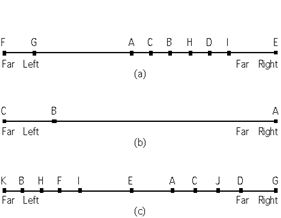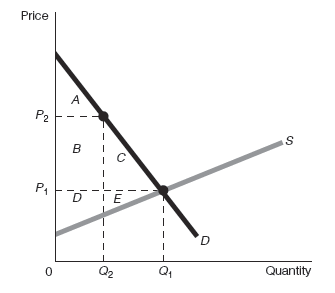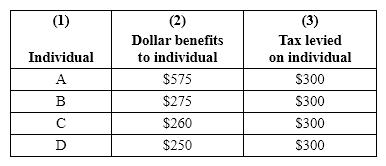Exam 18: Public Choice and Special-Interest-Group Politics
Exam 1: What Economics Is About174 Questions
Exam 2: Production Possibilities Frontier Framework157 Questions
Exam 3: Supply and Demand: Theory224 Questions
Exam 4: Prices: Free, Controlled, and Relative123 Questions
Exam 5: Supply, Demand, and Price: Applications80 Questions
Exam 6: Elasticity204 Questions
Exam 7: Consumer Choice: Maximizing Utility and Behavioral Economics179 Questions
Exam 8: Production and Costs246 Questions
Exam 9: Perfect Competition187 Questions
Exam 10: Monopoly195 Questions
Exam 11: Monopolistic Competition, Oligopoly, and Game Theory172 Questions
Exam 12: Government and Product Markets: Antitrust and Regulation158 Questions
Exam 13: Factor Markets: With Emphasis on the Labor Market182 Questions
Exam 14: Wages, Union, and Labor133 Questions
Exam 15: The Distribution of Income and Poverty100 Questions
Exam 16: Interest, Rent, and Profit195 Questions
Exam 17: Market Failure: Externalities, Public Goods, and Asymmetric Information183 Questions
Exam 18: Public Choice and Special-Interest-Group Politics129 Questions
Exam 19: Building Theories to Explain Everyday Life: From Observations to Questions to Theories to Predictions61 Questions
Exam 20: International Trade153 Questions
Exam 21: International Finance121 Questions
Exam 22: The Economic Case for and Against Government: Five Topics Considered82 Questions
Exam 23: Stocks, Bonds, Futures, and Options110 Questions
Select questions type
Logrolling is the exchange of votes to gain support for legislation.
Free
(True/False)
5.0/5  (35)
(35)
Correct Answer:
True
Rational ignorance exists because voters are apathetic.
Free
(True/False)
4.8/5  (31)
(31)
Correct Answer:
False
Why do many prospective voters choose to watch sports on television rather than watching the news or political roundtables? In your answer, be sure to mention the role played by rational ignorance.
(Essay)
4.8/5  (42)
(42)
Which of the following predictions is consistent with public choice theory?
(Multiple Choice)
4.8/5  (33)
(33)
Exhibit 32-2  Refer to Exhibit 32-2-(c). Two candidates are competing for an electorate consisting of 11 voters labeled A-K shown positioned with respect to their ideological stands on issues. The median voter theory would predict that candidates will assume the ideological position(s)
Refer to Exhibit 32-2-(c). Two candidates are competing for an electorate consisting of 11 voters labeled A-K shown positioned with respect to their ideological stands on issues. The median voter theory would predict that candidates will assume the ideological position(s)
(Multiple Choice)
4.8/5  (36)
(36)
Suppose U.S. peanut butter producers are facing increased foreign competition. Which argument is least likely to be used by the U.S. firms' lobbyists to urge legislation to restrict imports of peanut butter?
(Multiple Choice)
4.9/5  (38)
(38)
Simple majority voting sometimes leads to projects being undertaken whose costs are greater than the benefits. How is this possible?
(Multiple Choice)
5.0/5  (26)
(26)
Exhibit 32-4
 Refer to Exhibit 32-4. At the market equilibrium price of the good, producers' surplus is the area
Refer to Exhibit 32-4. At the market equilibrium price of the good, producers' surplus is the area
(Multiple Choice)
4.9/5  (34)
(34)
Exhibit 32-1  Refer to Exhibit 32-1. The exhibit shows the breakdown of benefits and costs for a four-person town of a proposed $1,200 purchase of books for the public library. How will each of the four persons, A-D, vote? (The first answer in the list is how person A would vote, the second is how person B would vote, and so on, so that "for" indicates that the individual would be in favor of having the additional books purchased by the library.)
Refer to Exhibit 32-1. The exhibit shows the breakdown of benefits and costs for a four-person town of a proposed $1,200 purchase of books for the public library. How will each of the four persons, A-D, vote? (The first answer in the list is how person A would vote, the second is how person B would vote, and so on, so that "for" indicates that the individual would be in favor of having the additional books purchased by the library.)
(Multiple Choice)
4.9/5  (29)
(29)
It has often been remarked that Democratic candidates are more liberal in the Democratic primaries and Republican candidates are more conservative in the Republican primaries than either is in the general election. The explanation for this is most probably that
(Multiple Choice)
4.7/5  (28)
(28)
The voting outcome and the most preferred outcome of the median voter are the same in a simple majority vote where there are several options from which to choose.
(True/False)
4.8/5  (32)
(32)
A political candidate running in a two-person race is likely to occupy
(Multiple Choice)
4.8/5  (27)
(27)
Political candidates tend to identify themselves as being "middle-of-the-roaders", while they tend to label their opponents as a member of the political fringe.
(True/False)
4.9/5  (41)
(41)
Showing 1 - 20 of 129
Filters
- Essay(0)
- Multiple Choice(0)
- Short Answer(0)
- True False(0)
- Matching(0)